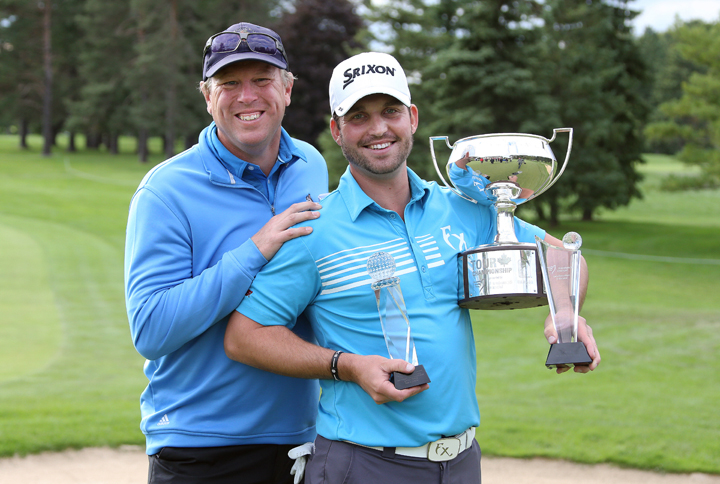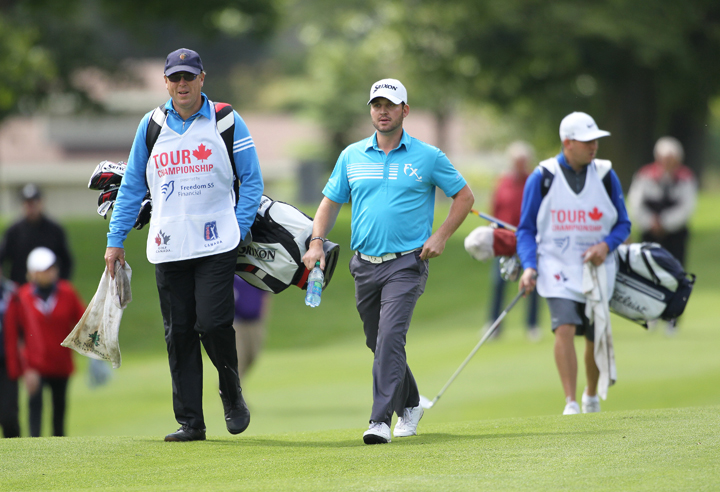LONDON, Ont.— Rarely do you get a front row seat to watch someone’s life change in a positive way.

But over four days, some dreary, wet and windy, others filled with brilliant sunshine, I had a front row seat to watch Vancouver golfer Ryan Williams alter his professional career.
On Sunday, Williams, a 33-year old pro and former top hockey player, shot the best back nine of his career. When he made the final putt on the 18th, a two-and-a-half footer, Williams won PGA Tour Canada’s Tour Championship. For winning, he took home $27,000, plus another $10,000 for being the tour’s top Canadian golfer. But more importantly, he gets a shot at moving onto the Web.com Tour, the next stop to his ultimate goal of playing on the PGA Tour.
As a journalist, I’ve spent most of my life observing, watching others and trying to put some context on their actions in a way that’s clear for my readers. But in the case of Williams, I became part of the story. I’ve known Williams for a couple of years, ever since meeting him at a tournament in Scarborough, Ont. We’ve kept in touch and this year I asked if he wanted to save some cash and stay with my family the week the tournament was played at nearby Sunningdale Golf and Country Club, a private club not far from my home in London, Ont. I also asked if he wanted a caddie. He accepted on both counts.
That meant on Wednesday morning I was out on the fairways for a practice round, with Williams’ bag over my shoulder, a damp, stinky, and often muddy towel in my pocket, helping out with yardages and putts, keeping the clubs clean and suggesting which way the wind was blowing. There’s an old adage that a caddie at a professional tournament need only do three things: show up, kept up and shut up.
That’s not how Williams sees it. He asked my opinion, consulted me on reading the way putts would snap, and asked my perspective on which club he should hit. In time it felt like we were a team, though admittedly I didn’t have to smash a drive or the result would have been very different.
Interestingly, Williams spent much of the summer traveling with another west coast golfer, Adam Cornelson, and the 26-year old also stayed at my house. Cornelson had a mixed year that he turned around with solid play in the final weeks of the season.
The week would turn out to be one the friends will surely never forget. Williams and Cornelson battled back and forth through the opening rounds, and on the final round Sunday found themselves only a couple of shots out of the lead and playing in the two final groups.

Get breaking National news
I’ve caddied in pro tournaments before; for a golf writer it is kind of a rite of passage, something that gives you insights into the heart of competition.
I’ve watched PGA Tour star Gary Woodland smash balls into the distance while carrying his heavy tour bag and witnessed Jim Furyk dissect a course during a pro-am while helping an exec pick clubs. I’ve also watched the struggles. Last year at the Tour Championship I saw my player, Mike Mezei, give it one last try, recognizing his professional golf career was near the end.
That’s the thing. Spend a week carrying a pro’s bag and you become emotionally connected to the player. You falter when a putt slides by, and you are elated with a shot that rockets to the flag and falls gently like a bird with sore feet.
By the final nine, Williams was being patient, but the leader was starting to move away. To his credit, he never let it get to him. He remained patient and focused.
“RT, we’re going to go five deep on the back,” he said, suggesting in golf speak that he’d make five birdies. “That’ll get it done.”
It didn’t take long for it look like his goal wouldn’t be met. On the 10th hole his drive plugged in muddy rough just off the fairway. We called a rules official who determined the ball wasn’t embedded. That meant Williams had to smash at a ball submerged in mud, and the result lurched forward before diving into long grass. When his pitch into the green came up short I was convinced this time his chances were dashed, that he’d make bogey and the leader, Clayton Rask, a bow hunter from Minnesota who travels in his own RV, would win the tournament.
WATCH: PGA Tour Canada takes over London, Ont.
If Williams was deflated he never showed it, instead willing a long putt into the hole. That righted the ship and he went on to play one of the best back nines of his career, dumping in a final birdie on 17 to tie with Rask and Cornelson, who was finishing a hole ahead.
The situation was so tension-filled that I’m surprised Williams could pull back his driver on the final hole, a 450-yard par four. A few hundred spectators milled around, watching the action. Williams hammered another drive down the right side of the fairway, match almost to the yard by Rask’s strike.
That’s when Rask made an unusual error, electing to fire at a pin on the left side of the green. His ball soared and dove to the left, ending up just long off the green. This was an opportunity.
“This is a perfect 7-iron,” Williams announced. “What do you think for a line? At the guy in the red shirt?”
There’s a point where the caddie is simply there to reinforce what the player already knows. Williams recognized it was the perfect club and the right line, and wanted to be reassured given the pressure.
“That’s it, R-dub,” I said confidently, using William’s nickname. “Hit it smooth.”
He did, and the ball flew to the middle of the green, leaving a simple uphill putt. As I walked to the green I looked at the scoreboard. Cornelson, Williams’ friend, had made bogey, dropping out of the lead (and ultimately finishing in a tie for second). When Rask stubbed his chip and then ran his par putt well by the hole, Williams needed two putts to win. As he’d done throughout the tournament, he consulted his caddie. We agreed on the line, and the putt rolled just by. He quietly made the comebacker and walked over to shake my hand.
“Did I win?” he said, clearly lost in the moment.
“You sure did,” I said, a broad smile across my face and shaking his hand as he pulled me in for a bro-hug.
“Man, you were a big part of this,” he said.
A big part is an overstatement. I was part of his win, but I never hit a shot or had to deal with a putt that lipped out. I felt pressure, but it wasn’t the pressure to perform.
Still, I contributed where I could and had the opportunity to feel the nervous tension that pounds down on you when all you need is one more great shot. It may never happen for me again—I think I’m a better journalist than caddy, frankly—but if that was my only opportunity, I’m glad I took it.
Victory, it turns out, is sweet, even for the caddy with the muddy towel.







Comments
Want to discuss? Please read our Commenting Policy first.